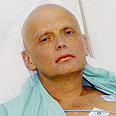The book was published in London in 1911 and presented readers with a complex plot that included espionage, counter espionage, informants, assassinations and romance throughout Russia and the Russian community in Western Europe.
The message of the book was chilling: You Westerners don't try understanding Russia and its conduct, it is a riddle shrouded in mystery and you will not be able to decipher it: "… oppressed society where the noblest aspirations of humanity… prostituted to the lusts of hate and fear, the inseparable companions of an uneasy despotism."
It's difficult not recalling Conrad's book in face of the targeted killing of Alexander Litvinenko, the former KGB spy who was poisoned by radioactive polonium-210 on British territory.
Polonium, an extremely rare element, was first discovered in 1898 by the couple Maria Curie Skłodowska and her husband Pierre. Curie Skłodowska was a controversial scientist who became the first two-time Nobel laureate in two different fields of science (physics and chemistry.) She named polonium after her beloved homeland, Poland, which was under Russian occupation at the time.
Weapon of mass destruction
The fatal isotope can only be produced by sovereign states with nuclear reactors and sophisticated laboratories. A single gram of the substance is enough to poison one hundred million people; it is the type of poisoning that has no cure.
Polonium 210 is therefore a weapon of mass destruction, and its use by agents of one of Russia's intelligence wings is the first case of a nuclear-radioactive terror perpetrated on Western territory.
Yelena Georgevna Bonner, a human rights activist in the former Soviet Union and widow of the late Andrei Sakharov, described the assassination as a new type of Chernobyl, and warned the West against nuclear war Russian style.
But in the West as in the West, it prefers turning a blind eye to what is blatantly clear. Police forces are investigating the affair in secret, governments are hesitant and the media is proposing unfounded conspiracies.
How is it possible, ask the naïve statesmen and commentators, that the ruling Russian government, with clear interests in developing fruitful commercial ties with the West and aspirations to be viewed as moderate, would dispatch murderers to the heart of Europe with such a dangerous substance that leaves such a distinct trail?
This could indeed be the case. The Russian assassination culture is void of Western logic, as articulated by Conrad and reiterated by historian Simon Sebag Montefiore in his book "Stalin - The Court of the Red Tsar."
Montefiore terms Bolshevik communism as "a social system based on blood letting," and concludes that Stalin and members of the Soviet leadership, killed enthusiastically, cheaply, almost joyfully…
Tyrannical curse still exists?
With the collapse of communism, there was a brief period where there was hope that Russia had finally succeeded in ridding itself of the tyrannical curse. This was apparently false hope. Ghosts of the tyrannical-dictatorial past have raised their heads, primarily because contrary to other east European countries, the Russians never settled scores with their past and murderers.
Russia is currently the only country actually being run by a gang of former colonels and agents from the era of the Soviet security establishment; it is only natural, therefore, that for political purposes and intimidation they are using the only means they are familiar with: Showcase killings.
In Conrad's book "Under Western Eyes" he noted that the only thing that changed in Russia since the transition from the Tsarist rule to the communist rule was a change of name. His book also includes this prophetic statement:
The oppressors and the oppressed are all Russians together; and the world is brought once more face to face with the truth of the saying that the tiger cannot change his stripes nor the leopard his spots.

















